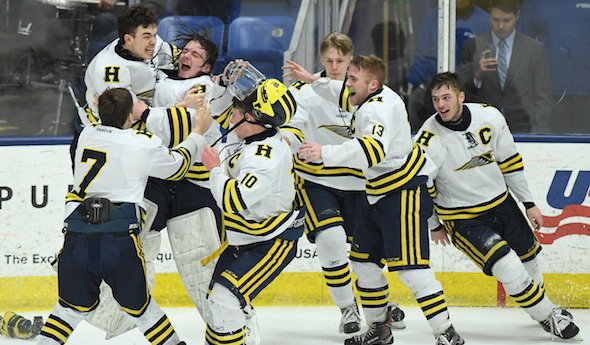
Dedication Pays Off With Hartland Title
March 10, 2018
Second Half reports
PLYMOUTH — Josh Albring and Jake Behnke didn’t have to keep playing hockey for Hartland High School.
They were certainly good enough to go back to AAA travel programs, but they never bought into the notion that going that route is the only way to move on in the sport.
The reward for their loyalty to Hartland came Saturday when the senior centers led the Eagles to their first MHSAA championship after the program had come close each of the past six seasons.
Behnke scored two goals and Albring one in Hartland’s 4-2 victory over 14-time MHSAA champion Trenton in the Division 2 title game at USA Hockey Arena.
Behnke finished with five goals in Hartland’s two games this weekend at USA Hockey Arena, while Albring had a goal and four assists over the Semifinal and Final.
Albring was the first Hartland player to break free from the pile of players in the championship celebration. He headed for the team bench to exchange hugs with the coaching staff.
“I came here my sophomore year,” Albring said. “I had zero confidence in my game and where I was at. All the coaches on the bench I went and hugged today, they’re the only reason we’re here today and they’re the reason I’ll probably play hockey next year. They changed my love for the game, made it so much more fun, so much more enjoyable and easier to learn, too. Everything goes to them. They’re by far the best coaches I’ve ever had.”
It’s hard to believe a player like Albring lacked confidence, considering he made all-state as a sophomore and junior and likely will make it this season after scoring 10 goals and tallying 42 assists.
“He was the same size as a sophomore,” Hartland coach Rick Gadwa said. “He’s a big boy that’s got some puck skills and can play the hard part of the game. Josh didn’t get worse because he scored less goals this year. That guy decided that, as a player, if I’m going to play at the next level, I’m going to have to change my role. He leads our team in blocked shots; he probably leads the state in blocked shots. He doesn’t lose board battles. He’s going to be a guy who somebody is going to be lucky to have next year.”
Behnke, a second-team all-state pick last season, emerged as one of the top players in Michigan this winter. He finished with 35 goals and 21 assists.
 “Jacob Behnke has proved, as well as some other guys, you can play high school hockey and still develop,” Gadwa said. “Jacob Behnke will play junior hockey. He, in my opinion, was the best player in the tournament thus far and will probably finish that way. He’s dominant. To watch where he was his sophomore year, he was always good, to watching him become elite is really a special thing to see. He worked his butt off every offseason and he got better every day from the first day he stepped on the ice.”
“Jacob Behnke has proved, as well as some other guys, you can play high school hockey and still develop,” Gadwa said. “Jacob Behnke will play junior hockey. He, in my opinion, was the best player in the tournament thus far and will probably finish that way. He’s dominant. To watch where he was his sophomore year, he was always good, to watching him become elite is really a special thing to see. He worked his butt off every offseason and he got better every day from the first day he stepped on the ice.”
Trenton reached its 21st MHSAA championship game by defeating three teams ranked among the top six over five playoff games. The third-ranked Eagles proved to be too much, jumping out to a 4-0 lead after two periods and holding off a late charge by No. 5 Trenton.
“I don’t think anyone gave us much of a shot at the beginning of the year,” Trenton coach Chad Clements said. “To get here, I know all the guys wanted to win, but I was proud of their efforts. They proved a lot of people wrong this year. A couple bad mistakes by us early on, but they never quit battling. I wish it would’ve ended differently.”
Behnke scored the only goal of the first period with 6:58 left when he took a pass from Joey Larson and put a shot up high while falling to the ice.
The biggest period in Hartland hockey history was the second. The Eagles took control of the game by scoring three times in a 7:17 span.
Albring scored with 9:31 left in the period, Behnke scored with Hartland two men short with 3:11 left and Larson made it 4-0 with 2:14 to go.
Nolan Szczepaniak and Brandon Clark had power-play goals to get Trenton within two with 2:05 left in the third period, but the Trojans couldn’t get another puck past Hartland goalie Brett Tome. Tome finished with 27 saves.
“It was hard to battle back,” Clements said. “It just kept getting harder and harder, but they stuck with it. The third period we came out and their goalie played exceptionally well. We just couldn’t get enough past him.”
Trenton allowed only three goals over five playoff games before the Final. Hartland outscored six playoff rivals by a combined 48-4.
PHOTOS: (Top) Hartland players celebrate their first MHSAA championship Saturday at USA Hockey Arena. (Middle) The Eagles push a goal past Trenton into the back of the net.
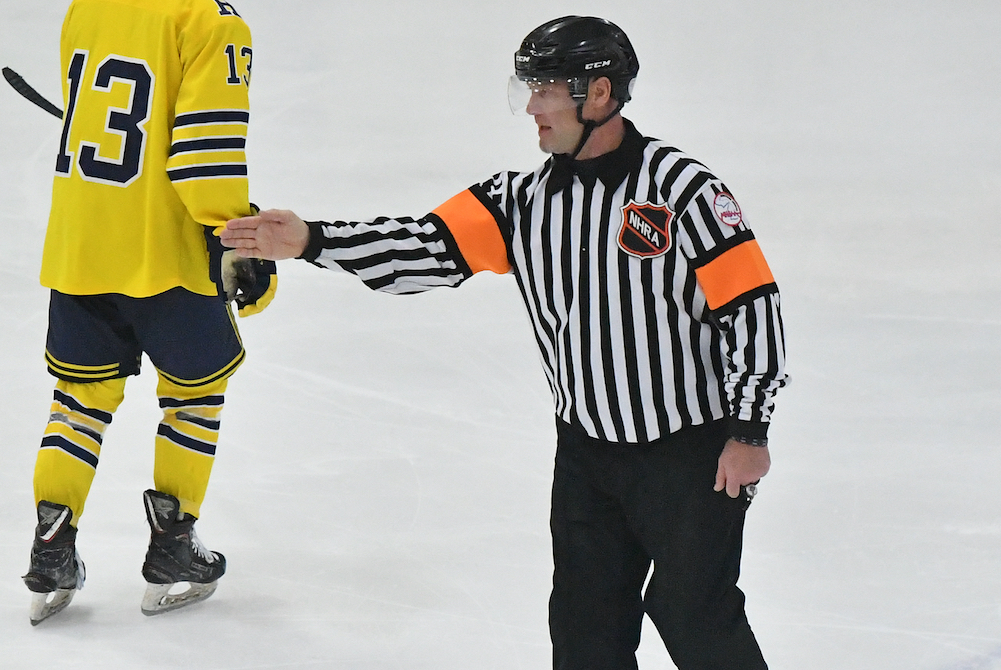
Retired NHL-er Back on Ice to Answer Call - By Making Them
By
Rob Kaminski
MHSAA benchmarks editor
March 16, 2023
The most accomplished skater on the ice during Friday’s triple-overtime MHSAA Division 1 Semifinal hockey thriller between Hartland and Brighton was not wearing the school colors of either team.
In front of a packed house at Plymouth’s USA Hockey Arena, referee Bryan Smolinski was in stripes, just like the rest of his officiating crew.
In his former life, he pulled on plenty of sweaters before lacing up the skates. That happens when one logs more than 1,000 games, tallies nearly 300 goals (274) and close to 400 assists (377) with eight teams spanning a 15-year playing career in the National Hockey League.
So, how did the 52-year-old former star player find himself on the ice last weekend as one of the referees for the pinnacle weekend of this high school season? Good question, even for the man known as “Smoke” during his playing days.
“I was working in youth development programs a few years back and reached out to some Michigan guys I had connections with about other ways to help the game,” Smolinski said. “I called Kevin May just to chat and asked, ‘Hey, how’s your reffing going?’ He said, ‘You know, we’re down a little bit,’ then said, ‘Why don’t you do it?’ I said, ‘Not a chance,’” Smolinski laughed.
Never Say Never
May persisted, imploring his friend to skate with him during a Fall league at Cranbrook in Bloomfield Hills. After eight weeks, once a week, Smolinski had a revelation.
“I’m like, ‘I’m kind of diggin’ this,’” Smolinski said “So, I did all the testing, and the educational part of it, and I really enjoyed it. I got with Danny (DiCristofaro) and his group, and he put me in as much as he could, and I really started to get my feet wet.”
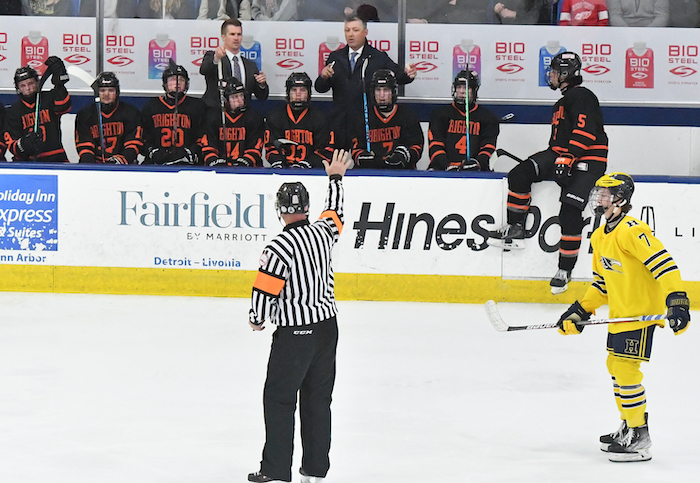 DiCristofaro is the assigner and referee-in-chief for the MHSAA’s Northeast Hockey Referees Association, and he has seen Smolinski’s growth first-hand.
DiCristofaro is the assigner and referee-in-chief for the MHSAA’s Northeast Hockey Referees Association, and he has seen Smolinski’s growth first-hand.
“Obviously he’s got great instincts and a feel for the game, along with a wealth of experience, all of which has allowed him to climb the ladder quickly,” said DiCristofaro. “It’s been a joy to watch his growth as an official.”
Fast forward to last Friday, and there were Smolinski and May sharing duties as referees during the MHSAA Semifinal with linesmen Michael Andrews and Thomas Robbins.
In between, there has been a learning curve that still continues, but the jump to officiating was not quite as daunting as his introduction to the NHL.
“I was scared to death. My first game was against Mario Lemieux. I’m in the old Boston Garden and now I’m playing against these guys and it’s their job, and they’re out there trying to make a living,” Smolinski recalled.
The emotions were not running nearly as frenzied for his first game as an MHSAA official, obviously, yet respect came in a different form.
“I couldn’t pick the puck up, I was breathing heavily; it was Kevin and me doing a two-man game in Brighton,” Smolinski recalled. “There were a few high-end kids playing, and I’m thinking, ‘I’m dying here.’ You know, there’s no training for that first time.”
What that experience did, however, was revitalize Smolinski in a new way. His playing career is well documented, not only in the NHL, but around Michigan. He enjoyed an honor-laden career at Michigan State University from 1989-93 before joining the Boston Bruins (who had drafted him three years earlier) at the end of the ’93 NHL campaign. Even after his final season, with Montreal in 2007-08, he stayed in the game via men’s leagues, or coaching his son, Max.
Smolinski and his wife, Julie, have three daughters: Ashtyn (22), Jojo (16) and Rylen (12), along with Max, whom dad coached for seven years including during a national championship run with a Little Caesars U15 team in 2019. Max, 19, is now playing collegiately at Rensselaer Polytechnic Institute.
So, for Smolinski, officiating offers a new chapter.
“Reffing brought back ... I wouldn’t say love of the game, because that’s always been there; it’s a different side of enjoying the game now. I have no horse in the race, my son’s off to college, my daughters are doing their thing; I wanted to find something new in the game,” Smolinski said. “I’ve coached, and I don’t want to do that. I found this, and I’ve stuck with it.”
Old College Ties
One of the great benefits of athletics at any level are the friendships made. For two kids who met in their first years on the MSU campus and forged a bond that lasts to this day, it’s amazing how their careers reached the pinnacle and have now come full circle.
Wes McCauley, an MSU teammate, is one of Smolinski’s best friends. After numerous years in the minor leagues, McCauley, like his friend, made it to the NHL. But McCauley made it as an official, working his first NHL game in 2003, when Smolinski was nearing the end of his playing career.
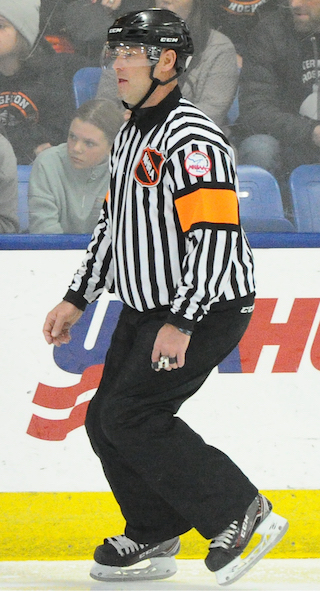 Their games lined up on just a few occasions in the NHL, and the two lobbied hard to have McCauley work Smolinski’s 1,000th career game in his final season with the Canadiens in 2007-08. The request, sadly, was denied by the league.
Their games lined up on just a few occasions in the NHL, and the two lobbied hard to have McCauley work Smolinski’s 1,000th career game in his final season with the Canadiens in 2007-08. The request, sadly, was denied by the league.
On the rare occasions when the friends did share the same ice, less than a handful by Smolinski’s count, it was McCauley who was forced to rebuff any attempts at fraternization. It’s just part of an official’s edict.
“For both of us, it was amazing; it was just great,” Smolinski said. “I’d say, ‘Hey man what’s up?’ and he says, ‘Can’t talk.’ I’m like, ‘What do you mean, we talk all the time.’ Again, he’s like, ‘Can’t talk, get away from me.’ You know, it was just business.”
McCauley then reached the 1,000-game plateau himself in 2018 and is still going strong as a regular selection for playoff duties with nine Stanley Cup Finals assignments, including last year.
So, it should have been natural for Smolinski to go to his old friend immediately for officiating pointers once he joined the ranks, right? Well, maybe not immediately.
“I talk to Wes all the time, but I actually hid it from him right out of the gate because I didn’t want to take his razzing. Eventually it got out, and he was loving it. He started sending me whistles and visors and pants,” Smolinski said, grinning. “And none of it fit, you know, because I’m older and fatter, and he’s so damn skinny. So, I still had to go out and get all new gear.”
Both Sides Now
Having been to the top of his profession, now moving to the other side of that same mountain that his friend McCauley scaled, the respect has grown for those blowing the whistle.
“The preparation for officiating is much more mental,” Smolinski said. “Way more rules oriented. You’re always trying to get away with things that you can as a player; now you have to police that.”
Smolinski has a distinct advantage.
“I know everything they’re trying to do because I’ve done it. I know where you’re going with the puck, I know what kind of breakout you’re trying to do,” Smolinski said. “I have all the instincts, now I just try to stay out of the way and not ruin their game. The most fun is watching the game develop and the ups and downs. For me to be out there and enjoy it with them, that’s the fun part.”
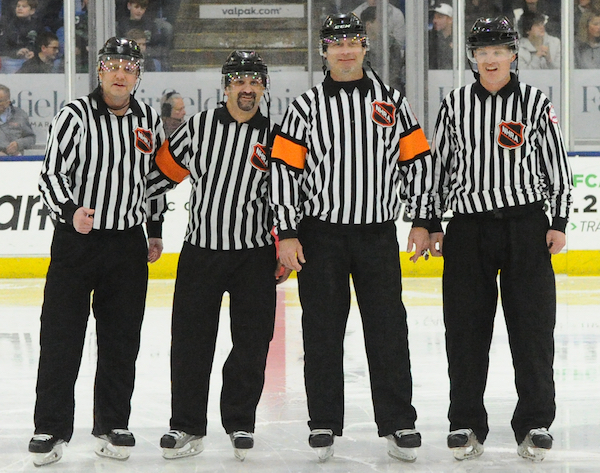 Those who have played hockey at any level have a built-in advantage should they consider the officiating avocation: the ability to skate. Unlike officiating in any other sport, skating is a prerequisite. This makes the pool limited, and almost solely composed of former players. Smolinski offers this advice.
Those who have played hockey at any level have a built-in advantage should they consider the officiating avocation: the ability to skate. Unlike officiating in any other sport, skating is a prerequisite. This makes the pool limited, and almost solely composed of former players. Smolinski offers this advice.
“I prefer sticking with high school because I think there’s more decorum, more administrative structure. Kids are playing for their schools, there’s loyalty there,” said Smolinski. “And there is more accountability. People need report to athletic directors and supervisors. Other levels can be more loosely governed, or a bit more maverick in nature. Moms and dads get involved more, coaches maybe know a little less,” said Smolinski.
He has, in fact, worked a handful of non-school games, and there’s a stark difference.
“I wanted to see what was going on, and I see it first-hand,” Smolinski said. “There are some crazy people and parents out there, and these guys are getting absolutely tortured. I’ve been tortured. There has to be a level of respect for what officials do. I think schools can rein that in a little more. All the guys I’ve met give up a lot of time and work hard because they love to do it and love the game.”
All sports need an assist from school administration and from those who once played the games to keep the officials recruitment moving in the right direction. People like Smolinski can help.
“He clearly doesn’t need to do this, and that’s what makes it so fantastic,” DiCristofaro said. “We need more people who have played – at any level – to do what he’s done and stay in the game as officials.”
Smolinski continues to promote the game in other ways as well. Currently, he is involved in the NHL’s Learn To Play initiative, which aims to inspire youth and welcome more families into the hockey community.
“We work hand-in-hand with the NHL Players Association for player development and industry growth,” Smolinski said. “Ages 5 to 9 are introduced to hockey, get head-to-toe gear and instruction, and meet some former players.”
The idea is to have fun first, which can translate into years and maybe even a lifetime in the sport. It’s a lifetime that has given Smolinski so much and continues to do so as he watches it unfold for others from his new vantage point.
PHOTOS (Top) MHSAA official Bryan Smolinski signals during Friday's Division 1 Semifinal between Brighton and Hartland. (2) Smolinski, a retired NHL standout, communicates with the Bulldogs' bench. (3) Smolinski keeps watch during game play. (4) Smolinski, third from left, with his crew: Michael Andrews, Kevin May and Thomas Robbins.

